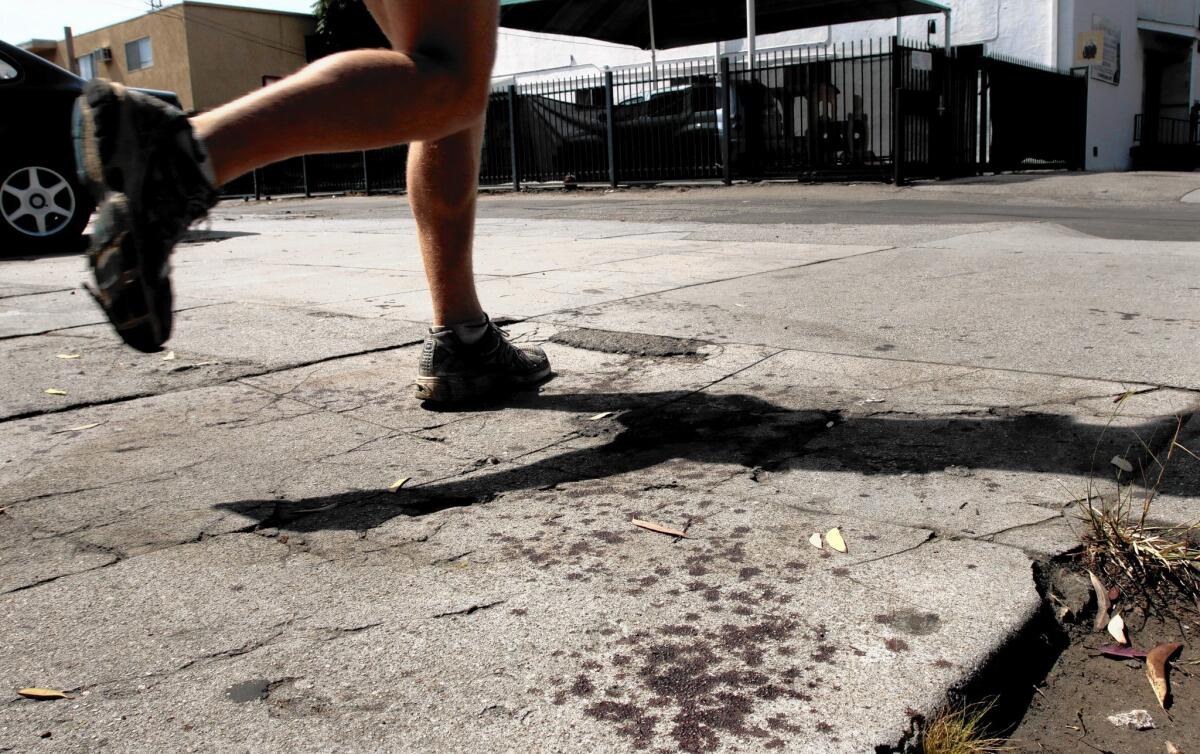Grad student’s slaying especially hard on USC’s Chinese community

- Share via
The assault that left a USC graduate student dead this week sent fresh shock waves through a university community already sensitive to safety concerns.
But the violence resonated particularly with USC’s Chinese community, which makes up nearly 40% of the university’s international student population.
Three students from China have been killed just blocks away from campus in the last three years: Ying Wu and Ming Qu, who were shot to death in 2012 during a botched robbery, and Xinran Ji, who police say was attacked early Thursday morning.
After Ji’s body was found, Chinese USC students took to online WeChat discussion groups, comforting each other as they tried to figure out which of their peers had been killed. Others called their parents overseas, trying to reassure them they were safe.
“So many parents worry every day now,” said Ran Liu, who got her master’s degree from USC in December but still lives near campus. “They send us here to study in the U.S. with so much hope, so much love.... It’s just so sad that something like this happened again.”
Liu said the apartment building where Ji lived, City Park, is popular among Chinese USC students.
Investigators believe Ji, 24, was walking home from a study group about 12:45 a.m. Thursday when at least three people assaulted him near 29th Street and Orchard Avenue. Los Angeles police said he was hit with a blunt object but managed to get back to his 30th Street apartment, where his body was discovered later that morning.
A police security hold was placed on any coroner’s reports, but university officials said it appeared Ji suffered a head injury.
Detectives determined that Ji had been attacked earlier in part because of a “significant amount of blood” they followed from his apartment to the scene of the assault, said an LAPD official familiar with the investigation. The dried splattered trail could still be seen Friday, weaving from the sidewalk to the street and back again.
No arrests have been made in the case. LAPD Lt. Andy Neiman said the attack may have been a crime of opportunity, but the exact motive remained unclear.
LAPD Cmdr. Andrew Smith said detectives with the department’s Criminal Gang Homicide Division were “pulling out all the stops to get this thing wrapped up.” He said the LAPD was in close contact with university officials regarding the investigation.
“It’s a very high priority for us to make sure that we take these guys into custody,” he said.
A security camera could be seen in a tree near one large splatter of blood, one of dozens of cameras trained on the streets surrounding campus. Extra cameras were added after Wu and Qu were killed.
The university’s Department of Public Safety and the LAPD increased their presence after the double murder. Public access to campus has been restricted, license plate readers were installed, and fingerprint scanners are used to enter student dorms.
The LAPD devoted 30 officers to a new University Park task force, a team focused primarily on the neighborhoods near USC but that also assists school police with on-campus incidents, according to Smith. LAPD detectives are also embedded with campus public safety staff, he said, and the agencies attend each other’s crime data meetings to stay up-to-date on what is affecting the university and surrounding area.
In a letter addressed to USC students and parents, USC police Chief John Thomas said the efforts had “significantly improved” safety on and around campus, but acknowledged that “statistics provide little consolation when we lose one of our own.”
After the measures were implemented, property crime at the university was cut in half during overnight hours, according to statistics from the university and the LAPD. Across all hours, violent crimes fell from 11 reported incidents in 2012 to four in 2013.
On Friday, Thomas vowed officials would be “redoubling … efforts to review and improve security” in the neighborhood.
“Unfortunately,” he wrote, “tragic events of this kind can take place despite our best efforts.”
Ji, an engineering student, was “focused on making a better future for all of us,” said Clayton Dube, director of the USC U.S.-China Institute. Ji graduated from a prestigious Chinese university, Dube said, but was inspired by advanced machinery he saw in California during a summer program. He came to USC in 2013.
“He wanted to create,” Dube said. “He was an engineer who wanted to solve problems, to make things better, to improve people’s lives through his work.”
Dube says that Ji’s death has had a “profound impact” on students, but that it was a matter of unfortunate circumstance.
“They were not targeted because they were students. They were not targeted because they were Chinese,” he said. “They were targeted because they happened to have something or maybe had something that these criminals wanted and were willing to create great bodily harm to take.”
More to Read
Sign up for Essential California
The most important California stories and recommendations in your inbox every morning.
You may occasionally receive promotional content from the Los Angeles Times.












